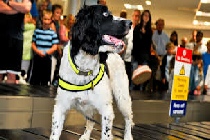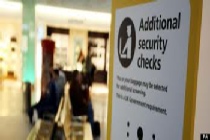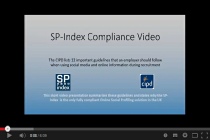
Call us today 0845 177 0700




RELATED ARTICLES



The ONSRA check will identify inconsistencies within an individual’s online profile by screening information across hundreds of social networking sites and millions of individual web pages, bringing together the information into a consolidated and easy to interpret result which does not compromise the privacy of the individual.
Airports like many other high footfall buildings are physically designed to accommodate
highly effective onsite security -
Given the number of staff and the potential ‘points of failure’ involved in running
such operations as Luton Airport, as well as the importance to ensure that staff
working in the environment do not present a trojan horse style risk, stringent pre-
Check-
It takes a recruiter just 90 seconds to request an ONSRA, and the potential benefits
from assessing the security risk through Online Social Profiling is not just financial,
but life and society critical. In short, the ONSRA is about filling a current security
gap and enhancing processes by using modern solutions and intelligence in an appropriate,
fair, and non-
So, what are the financial and social benefits of an ONSRA check? Here are a few questions for the Aviation CFOs to answer.
Remember the evaluation by Abelite Consulting Ltd who stated costs in excess of £500k for the false alarm at Luton?
u What would be the cost of an incident caused or allowed by an extremist sympathiser
member of staff? The risk and life cost is infinite. If an airport could predict
the behaviours of an individual through a simple Online Social Profiling check, who
would argue that it is not an essential pre-
u What would be the cost to society of an illegal immigrant entering the UK due to a border control officer allowing access?
u What would be the cost of a fatal piece of luggage being ‘allowed through’ by an
extremist sympathiser during check-
These are just a few questions to consider, and admittedly there are many more to
answer. What is clear is that for such a minor investment it’s no wonder that Airports,
Airlines and Security providers are adopting Online Social Profiling to enhance and
modernise their pre-
AVIATION INDUSTRY -
The Aviation sector is increasingly using Online Social Profiling to enhance standards
of recruitment and to strengthen pre-
For some time organisations have been using social media to check out the online
profiles of candidates during the recruitment process. Most try to do this internally
by Googling someone or scanning Facebook to find out more. This process is random,
time consuming and often returns inaccurate results. It is also non-
Those who carry out checks in a compliant way (known in the HR world as Online Social Profiling) will use third party suppliers to provide these checks who will ensure that only allowable and relevant information is passed back to the employer. This is the first important step towards remaining compliant [watch this compliance video for more information].
The immediate benefits are obvious. A company spends just 90 seconds to complete
a request for an individual’s Online Social Profile report by submitting only information
which has been provided by the candidate under traditional recruitment processes.
No social media account details, login names, or passwords are required and the candidate
opts-
The Aviation sector has increasingly been adopting this compliant approach of online profiling but organisations in the Aviation and Security sectors have additional incentives with the enhanced security check known as ONSRA.
ADDED BENEFITS FOR AVIATION AND SECURITY SECTORS -
Major incidents at UK airports are rare, but when they do occur the cost is phenomenal. When Luton Airport experienced a perceived security threat on the 8 Sept 2014, thousands of people were evacuated, more than 50 flights were cancelled, 13 flights diverted elsewhere, surrounding roads closed, bomb disposal experts drafted in and shifts extended throughout the night as incident procedures were initiated. In addition, lost retail revenues and reputational damage (it was a false alarm caused by some hair straighteners left in the security search area).
According to Abelite Consulting Ltd (specialist consultants in cost reduction programmes within the aviation industry) the total financial cost would have exceeded £500,000, ignoring the social cost.
The ONSRA (Online Network Security Risk Assessment) check is one of the latest techniques used by companies operating in the Aviation and Security sectors to counter the threat of terrorism. It is of particular interest to organisations which operate in an environment where high levels of safety and security are core objectives and where the security threat is at its greatest.
The ONSRA is an in-


The SP Index team are thought leaders in Online Social Profiling and are the UK's leading supplier of compliant profiling. If you would like further information about Online Social Profiling or wish to apply your own situation to our benefits calculator in order to evaluate your Return on Investment, please contact:
E: sarah.poynton@sp-
T: 0845 177 0700
Feel free to share your feedback on this article @SP_index and include the hash tag #onlinesocialprofiling.
www.linkedin.com/in/sarahpoynton
ENJOYED THIS POST?
Sign up for our newsletter to receive a summary of all new posts from the team at
the SP-
FURTHER BENEFITS
To illustrate, let’s use an example for a typical airport in the UK. A mid-
Assuming a replenishment level of 10%, this would result in 250 new recruits each
year. According to our database of historic profile results, 1 in 10 recruits will
receive a ‘red light’ status warning -
The results of 18 months of research by the SP-
So, what are the percieved benefits so far?
Assuming that recruiting managers would have spent a prudent 30mins for every recruit
looking into their online accounts -
The alternative is 250x90seconds = 6.25 hours spent to request 250 profile reports. This would be a time efficiency saving of an amazing 95%! In addition, the focus of the recruiter is improved, the process is now fully compliant, the candidate is treated fairly and the best talent is retained during the recruitment process.
u 95% less time will be spent carrying out online checks
u The airport will become fully compliant with legal and ethical guidelines and elements of discrimination will be removed
u Great talent will no longer be inadvertently or otherwise overlooked and the standard of recruitment will be maintained or even improved
Of course, if we assumed that the airport was not checking any staff at all, the proportion of those likely to demonstrate negative real life behaviours would remain at least the same at 25 of the 250.
Conclusion: Online Social Profiling would eliminate or in the least would minimise the number of Beta candidates entering the business.
COST AVOIDANCE -
Another most obvious area for achieving benefits is the downstream risk of HR professionals having to handle disciplinaries. Assuming the Beta candidates have been allowed into the organisation, and that 67% are found to carry their negative online behaviours into the workplace, this means that the HR team or line managers will need to handle 16 new Beta cases through disciplinary action each year. An inefficiency that potntially could have been avoided.
Russell HR Consulting Ltd (specialists in legal and disciplinary cases involving
social media) state that such cases cost on average £18k -
Applying our example, for 16 Beta candidates the cost would equate to an astonishing
£300k (£1,200 per recruiit assuming 250 new employees) before tribunal. A phenomenal
figure and ‘hidden’ cost that could have been predicted and avoided using Online
Social Profiling. And here’s a statistic for the CFO -
Combining the implementation of Online Social Profiling of candidates with modernised
and strengthened staff policies to reflect this innovative and effective HR power-
Aviation companies tend not to reject Beta candidates outright just due to the result of their profile. Online Social Profiling is a positive and engaging tool to allow both the employer and the candidate to reconcile cultural values and expectations from the outset via an open and engaging process. It is only when the Online Social Profile result adds weight to other concerns (such as failed DBS and/or credit checks and poor employment references) that it is used as a final decision factor.
u Significant cost avoidance and ROI will be achieved (on average £1,200 per recruit) from profiling new staff and engaging early & openly with Beta candidates
u Cultures, values and expectations between employer and employees become aligned
-
u Improved business focus for HR and line managers with a significant reduction in the number of disciplinaries and unfair dismissal claims
CONCLUSION
Online Social Profiling is a fully compliant tool that is generating enormous benefits to the Aviation and Security industry, delivering not just major efficiency improvements, but innovative methods to predict future risks to the safety and security of stakeholders as well as high Returns on Investment £££. It is no wonder this important and volatile sector is increasingly adopting such an innovative tool.